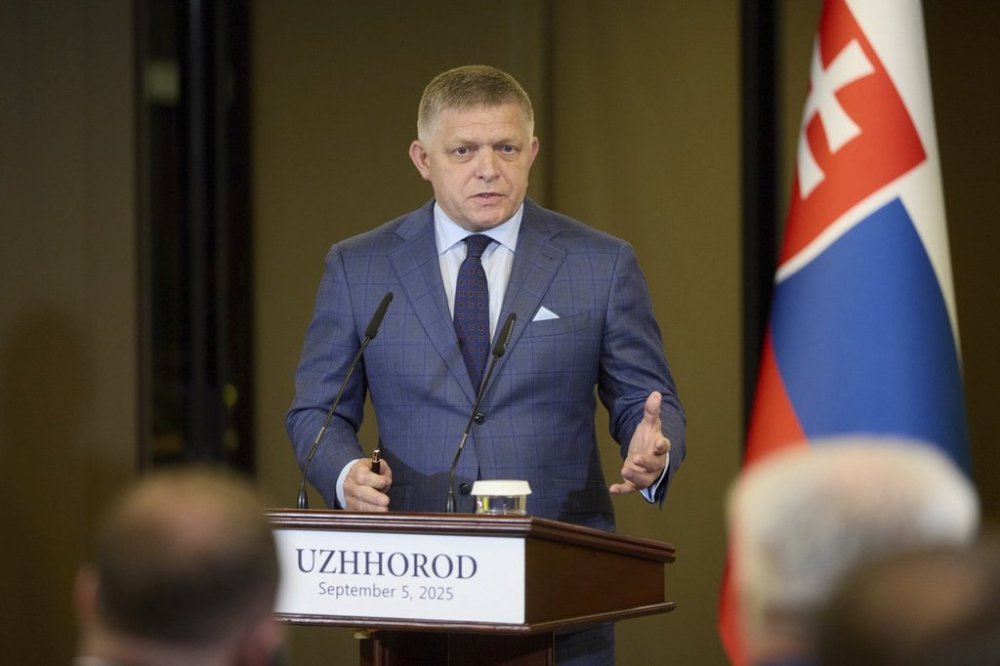Slovakia passes constitutional amendment to recognize only 2 sexes, sparking human rights concerns
Advertisement
Read this article for free:
or
Already have an account? Log in here »
To continue reading, please subscribe:
Monthly Digital Subscription
$1 per week for 24 weeks*
- Enjoy unlimited reading on winnipegfreepress.com
- Read the E-Edition, our digital replica newspaper
- Access News Break, our award-winning app
- Play interactive puzzles
*Billed as $4.00 plus GST every four weeks. After 24 weeks, price increases to the regular rate of $19.00 plus GST every four weeks. Offer available to new and qualified returning subscribers only. Cancel any time.
Monthly Digital Subscription
$4.75/week*
- Enjoy unlimited reading on winnipegfreepress.com
- Read the E-Edition, our digital replica newspaper
- Access News Break, our award-winning app
- Play interactive puzzles
*Billed as $19 plus GST every four weeks. Cancel any time.
To continue reading, please subscribe:
Add Winnipeg Free Press access to your Brandon Sun subscription for only
$1 for the first 4 weeks*
*$1 will be added to your next bill. After your 4 weeks access is complete your rate will increase by $0.00 a X percent off the regular rate.
Read unlimited articles for free today:
or
Already have an account? Log in here »
BRATISLAVA, Slovakia (AP) — Slovakia’s parliament on Friday passed an amendment to the constitution that recognizes only two sexes, along with other measures that critics say might breach the country’s international obligations and undermine the protection of human rights.
The amendment, which was drafted by populist Prime Minister Robert Fico’s government, required a three-fifths majority. It passed with 90 votes of the 150-seat National Council. Twelve conservative opposition lawmakers helped the ruling coalition win the vote.
The amended constitution now recognizes only two sexes, male and female, and states that Slovakia retains sovereignty in matters of “national identity,” which is not specifically defined, especially in “fundamental cultural-ethical questions.”

The amendment also makes it almost impossible for anyone other than married couples to adopt children. The constitution had already defined marriage as “a unique union between a man and a woman.”
Parental consent is now needed for access to sexual education and equal pay for men and women is guaranteed.
Justice Minister Boris Susko told parliament that the amendment should boost traditional values.
Amnesty International condemned the move. “Today, the Slovak government chose to follow the lead of countries, such as Hungary, whose policies have led to an erosion of human rights,” it said in a statement.
Council of Europe Commissioner for Human Rights Michael O’Flaherty previously urged lawmakers not to give a green light to the changes. He said they deny “the realities of trans and intersex people and may impact on human rights guarantees such as access to legal gender recognition.”
“Seeking to disapply specific rights because they touch upon ‘national identity’ would be fundamentally incompatible with the Slovak Republic’s international obligations,” he added.
Fico has long been a divisive figure. His critics claim that under his rule Slovakia has abandoned its pro-Western course and is following the direction of Hungary under Prime Minister Viktor Orbán.
Thousands have repeatedly rallied in the capital and across Slovakia to protest Fico’s pro-Russian stance and other policies.

